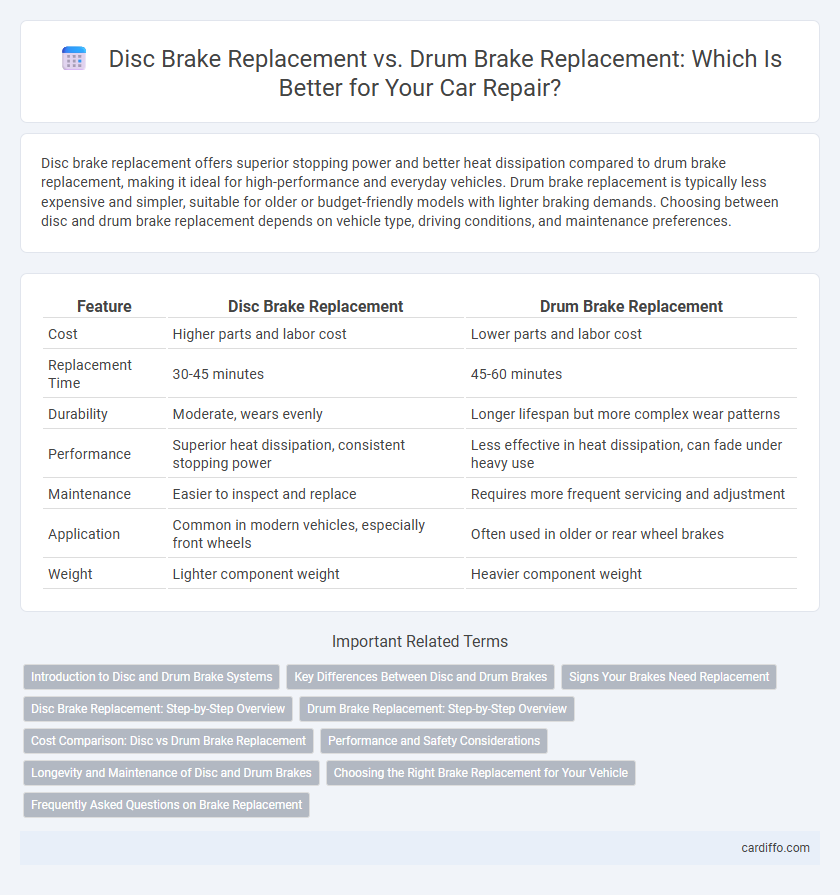Disc brake replacement offers superior stopping power and better heat dissipation compared to drum brake replacement, making it ideal for high-performance and everyday vehicles. Drum brake replacement is typically less expensive and simpler, suitable for older or budget-friendly models with lighter braking demands. Choosing between disc and drum brake replacement depends on vehicle type, driving conditions, and maintenance preferences.
Table of Comparison
| Feature | Disc Brake Replacement | Drum Brake Replacement |
|---|---|---|
| Cost | Higher parts and labor cost | Lower parts and labor cost |
| Replacement Time | 30-45 minutes | 45-60 minutes |
| Durability | Moderate, wears evenly | Longer lifespan but more complex wear patterns |
| Performance | Superior heat dissipation, consistent stopping power | Less effective in heat dissipation, can fade under heavy use |
| Maintenance | Easier to inspect and replace | Requires more frequent servicing and adjustment |
| Application | Common in modern vehicles, especially front wheels | Often used in older or rear wheel brakes |
| Weight | Lighter component weight | Heavier component weight |
Introduction to Disc and Drum Brake Systems
Disc brake systems use a rotor and caliper mechanism to provide consistent, efficient stopping power with superior heat dissipation, making them ideal for high-performance vehicles. Drum brake systems rely on brake shoes pressing outward against a drum, offering a simpler and more cost-effective solution commonly found in older or economy cars. Understanding the structural and functional differences between disc and drum brakes is essential for making informed decisions about maintenance and replacement.
Key Differences Between Disc and Drum Brakes
Disc brake replacement involves changing rotor and caliper components that provide superior heat dissipation and stopping power compared to drum brake replacement, which requires servicing brake shoes and drums with a more enclosed design. Disc brakes offer better performance in wet conditions and require less maintenance, while drum brakes are typically more cost-effective but prone to heat buildup and fading. Understanding these key differences helps in choosing the appropriate braking system based on vehicle requirements and driving conditions.
Signs Your Brakes Need Replacement
Worn brake pads, persistent squealing, and reduced stopping power are key signs your disc brakes need replacement, while grinding noises, brake pedal vibration, and extended stopping distances often indicate drum brake wear. Visual inspection of brake pad thickness and grooves on rotor surfaces can help detect disc brake issues early. For drum brakes, uneven brake shoe wear and fluid leaks in the wheel cylinder typically signal the need for a replacement to ensure optimal braking performance.
Disc Brake Replacement: Step-by-Step Overview
Disc brake replacement involves removing the wheel, caliper, and old brake pads before installing new pads and a resurfaced or new rotor to ensure optimal stopping performance. Proper torque specifications for bolts must be followed to avoid brake system failure and ensure safety. Bleeding the brake lines after reassembly removes air bubbles, maintaining hydraulic pressure and reliable brake function.
Drum Brake Replacement: Step-by-Step Overview
Drum brake replacement involves removing the wheel, detaching the brake drum, and inspecting internal components such as shoes, springs, and wheel cylinders for wear or damage. Cleaning the backing plate and applying brake grease to contact points ensures proper function before installing new brake shoes and reassembling the drum. Proper adjustment of the brake shoes after reassembly is crucial to maintain optimal braking performance and prevent premature wear.
Cost Comparison: Disc vs Drum Brake Replacement
Disc brake replacement generally costs more than drum brake replacement due to the complexity and materials involved in disc systems. Drum brakes typically have lower parts and labor expenses, making them a budget-friendly option for many vehicles. However, disc brakes offer better performance and durability, which may justify the higher upfront cost over time.
Performance and Safety Considerations
Disc brake replacement offers superior heat dissipation and more consistent stopping power under heavy use, enhancing overall vehicle safety and performance. Drum brake replacement, while generally more cost-effective and simpler to maintain, may experience decreased efficiency in wet conditions and is prone to brake fade during prolonged braking. Prioritizing disc brakes ensures better responsiveness and improved control, especially in high-performance or emergency scenarios.
Longevity and Maintenance of Disc and Drum Brakes
Disc brake replacement typically offers longer longevity due to superior heat dissipation and reduced wear compared to drum brakes, which are more prone to overheating and faster degradation. Maintenance of disc brakes is generally simpler and less frequent, as their open design allows for easier inspection and brake pad replacement, whereas drum brakes require more extensive disassembly for servicing. Choosing disc brakes enhances overall durability and lowers long-term maintenance costs, making them a preferred option for modern vehicles.
Choosing the Right Brake Replacement for Your Vehicle
Selecting the right brake replacement for your vehicle depends on factors such as driving conditions, vehicle type, and maintenance preferences. Disc brake replacement offers superior stopping power and heat dissipation, making it ideal for high-performance and heavy-duty vehicles. Drum brake replacement, often found in older or budget models, provides durability and lower costs but requires more frequent maintenance to prevent brake fade.
Frequently Asked Questions on Brake Replacement
Disc brake replacement typically takes less time than drum brake replacement due to easier access and fewer components involved. Drivers often ask if disc brakes offer better stopping power; generally, disc brakes provide more efficient heat dissipation, reducing brake fade under heavy use. Common concerns include the cost difference, where disc brake replacements tend to be more expensive but offer improved performance and longer service intervals compared to drum brakes.
Disc brake replacement vs drum brake replacement Infographic

 cardiffo.com
cardiffo.com